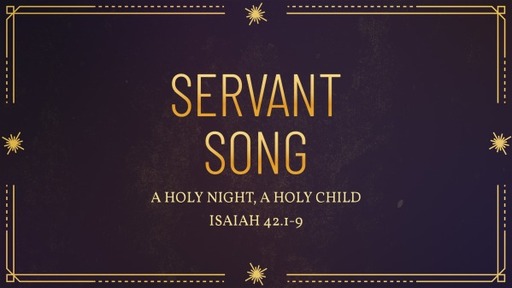Servant Song

God’s Servant Messiah (Isa. 42). Isaiah 42:1–7 is the first of four “Servant Songs” in Isaiah, referring to God’s Servant, the Messiah. The others are 49:1–6; 50:1–11; and 52:13–53:12. Contrast “Behold, they [the idols] are all vanity” (41:29) with “Behold My Servant” (42:1). Matthew 12:14–21 applies these words to the earthly ministry of Jesus Christ. He could have destroyed His enemies (the reed and flax), but He was patient and merciful. The Father delights in His Son, (Matt. 3:17; 17:5).
God will make his love known to us. He will give his glory to no other, nor his praise to our carved idols (v. 8). He will love us until we finally get it. He stakes his honor on that. Therefore, we are not confined to our abominations and prisons. God saves us not by telling us to lose ourselves in some vaguely defined cosmic All but by taking upon himself at his cross all the wrongs we’ve done and by giving back to us our truest selves that we lost so long ago. That is how God proves that he really is God.
We should believe this. In verse 9 God says, “Behold, the former things have come to pass, and new things I now declare.” What is he saying? God is proving himself here by prophecies. He gives us a verifiable short-term prediction by foretelling the coming of Cyrus. That happened, as a public event in our human history. This gives God instant credibility. But he does that to get us believing his long-term prediction of worldwide perfection through Christ. God is saying, “If I kept my word about Cyrus, and I did, and you know I did, then you can believe that I’ll keep my word about my servant. In fact, I launched his mission 2,000 years ago. It’s already underway. So dump your idols and trust me. I want you to be a part of my new world.” This is exciting. This calls for music!
